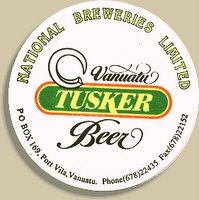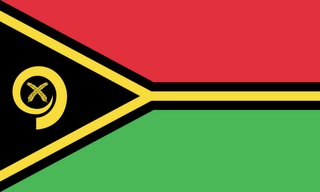Because of all the islands and sets of traditional beliefs, Vanuatu has some 106 indigenous languages. In the towns, because of the Anglo-French Condominium, English and French are widely spoken. But the national language is a reductive, musical form of pidgin English called Bislama.
Me drinkem kava. (I drink kava.)
Yu save tok tok long Inglis? (Do you speak English, or Do you savvy talk talk long English?)
The word that stands out the most in Bislama is “blong,” presumably a shorter form of “belong,” that is used, by turns, as “of,” “to,” and “is.”
Dipatmen Blong Agrikulta. (Department of Agriculture.)
Tabu blong ting bia, waen o kava. (No outside beverages, or It is taboo to bring beer, wine or kava.)
Bia blong yumi. (Our beer, or The beer that is for you and me.)
That last one is the motto of the Vanuatu national beer, Tusker. Perhaps not by coincidence, the national beer of Kenya is also called Tusker. In Kenya the bottle features the silhouette of an elephant, but it’s obviously a different tusk we’re talking about here—warthogs or bushpigs, which were brought to the islands.
In Kenya the bottle features the silhouette of an elephant, but it’s obviously a different tusk we’re talking about here—warthogs or bushpigs, which were brought to the islands.
Michener explained some of the tusk-related rituals in Tales of the South Pacific. The tusks of bushpigs, which grow up and curve inward from the front corners of the lower jaw, are symbols of status in some traditional Ni-Vanuatu cultures. The longer and more curved the tusk, the more status it grants. So to get the best tusks, villagers would confine the pigs so they could not file the tusks down as they would in their normal foraging. As a result, the tusks grow out and then loop back in, eventually, and likely very painfully, piercing the skin and embedding back in the pig’s lower jaw. A full looped tusk would represent the most elite status symbol and that image of a looping tusk (separated from the pig) graces both the bottle of Tusker and the national flag of Vanuatu.
A full looped tusk would represent the most elite status symbol and that image of a looping tusk (separated from the pig) graces both the bottle of Tusker and the national flag of Vanuatu.

These bushpig tusks, and lower jaws with dual tusks, are also among the most common and expensive souvenirs for sale in stores and markets here. A modestly curved tusk can bring as much as $50US, and I didn’t even ask after the price of the fully looped ones or the full mandibles in which both tusks curve and grow back into the jaw.
These items and many others were available for sale in the large open-air market of Port Vila, Vanuatu’s capital, which I passed through for a day on my way back to Fiji. Vila is a charming town crawling up a hillside from a clear blue bay (amazingly clear for a bay that gets a lot of boat traffic) with a faded French colonial atmosphere, some great little restaurants and a surfeit of duty-free shops. In fact, there are so many of these stores that the town resembles a cross between a beach town and an outdoor international airline terminal—the variety of booze, electronics, jewelry, tobacco and tchotchkes for sale in a few short blocks just boggles the mind. The town, the countryside, the people, the water and access to resorts and traditional outer islands would make this my recommendation for people looking for a vacation spot in the South Seas.
I’ve spent the last couple of days in Nadi, which is the tourism capital of Fiji (I passed it over for Suva, the capital, last time through). It provides access to resorts, but the town itself is a fair bit sketchier than Vila and instead of duty-free stores it features overpriced tourist mega-stores, one of which has an entire section devoted to coasters. Outside of one of these stores, a man in a grass skirt and face paint and carrying an ominous Fijian war club (for pictures with tourists), warned me to hold my bag close under my arm and avoid being surrounded if I ventured to the seedy south end of town. I had already been there, looking unsuccessfully for a money changer willing to convert my leftover Solomon Island dollars. I was advised that they’ve stopped using that currency entirely, but I don’t think that’s true because I spent them there only three weeks ago. I think there is just very little confidence on the Solomon economy.
I’m really just passing through Fiji on the way to Tuvalu, but it’s clear that the rumors of a coup appear to have been exaggerated. Life continues here as normal and the coup furor appears to have been, at least for now, just high-level jawing within the government. It could flare up again, I suppose, but even then it would be quite different than the popular ethnic uprisings that have happened before (and will probably happen again).
Me drinkem kava. (I drink kava.)
Yu save tok tok long Inglis? (Do you speak English, or Do you savvy talk talk long English?)
The word that stands out the most in Bislama is “blong,” presumably a shorter form of “belong,” that is used, by turns, as “of,” “to,” and “is.”
Dipatmen Blong Agrikulta. (Department of Agriculture.)
Tabu blong ting bia, waen o kava. (No outside beverages, or It is taboo to bring beer, wine or kava.)
Bia blong yumi. (Our beer, or The beer that is for you and me.)
That last one is the motto of the Vanuatu national beer, Tusker. Perhaps not by coincidence, the national beer of Kenya is also called Tusker.
 In Kenya the bottle features the silhouette of an elephant, but it’s obviously a different tusk we’re talking about here—warthogs or bushpigs, which were brought to the islands.
In Kenya the bottle features the silhouette of an elephant, but it’s obviously a different tusk we’re talking about here—warthogs or bushpigs, which were brought to the islands. Michener explained some of the tusk-related rituals in Tales of the South Pacific. The tusks of bushpigs, which grow up and curve inward from the front corners of the lower jaw, are symbols of status in some traditional Ni-Vanuatu cultures. The longer and more curved the tusk, the more status it grants. So to get the best tusks, villagers would confine the pigs so they could not file the tusks down as they would in their normal foraging. As a result, the tusks grow out and then loop back in, eventually, and likely very painfully, piercing the skin and embedding back in the pig’s lower jaw.
 A full looped tusk would represent the most elite status symbol and that image of a looping tusk (separated from the pig) graces both the bottle of Tusker and the national flag of Vanuatu.
A full looped tusk would represent the most elite status symbol and that image of a looping tusk (separated from the pig) graces both the bottle of Tusker and the national flag of Vanuatu. 
These bushpig tusks, and lower jaws with dual tusks, are also among the most common and expensive souvenirs for sale in stores and markets here. A modestly curved tusk can bring as much as $50US, and I didn’t even ask after the price of the fully looped ones or the full mandibles in which both tusks curve and grow back into the jaw.
These items and many others were available for sale in the large open-air market of Port Vila, Vanuatu’s capital, which I passed through for a day on my way back to Fiji. Vila is a charming town crawling up a hillside from a clear blue bay (amazingly clear for a bay that gets a lot of boat traffic) with a faded French colonial atmosphere, some great little restaurants and a surfeit of duty-free shops. In fact, there are so many of these stores that the town resembles a cross between a beach town and an outdoor international airline terminal—the variety of booze, electronics, jewelry, tobacco and tchotchkes for sale in a few short blocks just boggles the mind. The town, the countryside, the people, the water and access to resorts and traditional outer islands would make this my recommendation for people looking for a vacation spot in the South Seas.
I’ve spent the last couple of days in Nadi, which is the tourism capital of Fiji (I passed it over for Suva, the capital, last time through). It provides access to resorts, but the town itself is a fair bit sketchier than Vila and instead of duty-free stores it features overpriced tourist mega-stores, one of which has an entire section devoted to coasters. Outside of one of these stores, a man in a grass skirt and face paint and carrying an ominous Fijian war club (for pictures with tourists), warned me to hold my bag close under my arm and avoid being surrounded if I ventured to the seedy south end of town. I had already been there, looking unsuccessfully for a money changer willing to convert my leftover Solomon Island dollars. I was advised that they’ve stopped using that currency entirely, but I don’t think that’s true because I spent them there only three weeks ago. I think there is just very little confidence on the Solomon economy.
I’m really just passing through Fiji on the way to Tuvalu, but it’s clear that the rumors of a coup appear to have been exaggerated. Life continues here as normal and the coup furor appears to have been, at least for now, just high-level jawing within the government. It could flare up again, I suppose, but even then it would be quite different than the popular ethnic uprisings that have happened before (and will probably happen again).

0 Comments:
Post a Comment
<< Home